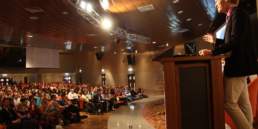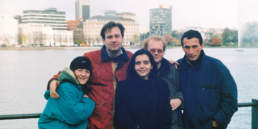25 years ago, 9th of November 1989. The fall of the Berlin Wall is the signal that the democratisation in the Eastern Bloc are irreversible, that democracy for the countries in Central and Eastern Europe is the future. 10th of November 1989: the autumn Agora in Salerno starts and the latest events in Berlin are the talk of the arriving members. 11th of November 1989: the Agora decided to open up AEGEE to students from Central and Eastern Europe. AEGEE-Salerno co-founder, Agora organiser and later CD member Alfonso Giordano looks back at these days, which turned AEGEE from a Western European students organisation into the AEGEE that we know and love. The days, which changed AEGEE forever.
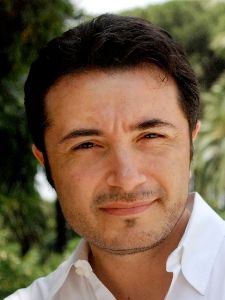
Golden Times: The Agora became a pivotal point in AEGEE’s history, because AEGEE opened up to the East. How do you remember this time?
Alfonso: There are two context situations to remember, one regarding the inside of the association, the other concerning the international environment of that time. Internally, after the three years – under the presidency of Frank Biancheri – characterized by the launch of new projects and successful initiatives, the Association suffered a stagnation phase. Despite this, a first increase in the number of antennae happened. AEGEE was about to change its structure and with this the feeling of the members. The “personal contacts” method was not working anymore and the concentration on the EC countries only was almost unhistorical, given also the overall association’s regress. Different way of administration, communication and decision-making were requested. The Comité Directeur did not address these needs, sometimes ignoring the shift of power from it to the Agora, causing discontent and disconnection.
Golden Times: And then there were also the revolutionary changes in Europe…
Alsonso: Yes, outside the Association, European politics was in turmoil and was about to witness a epochal change: the collapse of the East-West confrontation. This had repercussions around the world, paving the way for the best time of the European integration. These changes, inside and outside AEGEE, were interpreted, often in opposition to the Comité Directeur, by the East-West Working Group, led by Rainer Emschermann. I remember that time as a phase of both painful transformation and vivid search for new opportunities. Agora Salerno was going to be the venue for this first confrontation and AEGEE-Salerno a transition antenna between the two ways to conceive AEGEE’s role and organisation. Finally, but not easily, the decision was made: opening to the East.
Golden Times: How was the news spreading that the Berlin Wall fell, just one day before Agora begin?
Alfonso: The day of the official starting date of the Agora, that was the 10th of November, while some delegates were arriving, all the newscast were broadcasting that incredible news about that memorable 9th of November. It was a feeling not easily describable now. When, in 2009, I contributed to the making of the 20th Anniversary Book of AEGEE-Salerno, I searched on Youtube the old videos of those newscasts, here are a few headlines: “An historical night for the Berliner and for the whole world”, “A large crowd is celebrating in the streets”, “The history is moving fast, in a few days it is possible to delete decades of inertia”. Really mind-blowing!
Golden Times: The Agora organisers had some influence over the agenda setting?
Alfonso: Yes, to some extent this was true. Despite the process of decision making being strongly centralised in the hands of the Comité Directeur, you have to think that if on one side the lack of technology did not allow a broader discussion on the agenda issues, on the other side the CD had the necessity, for the same reason, to search for the cooperation of the organising antenna. Plus, there has been the special historical moment inside and outside AEGEE I described before.
Golden Times: AEGEE-Salerno was only nine months old, when you organised the Agora. How come that you shouldered such an important event?
Alfonso: At that time AEGEE was a quite young association. In fact, only four years had passed since the foundation in Paris in 1985 and in those years there weren’t many antennae. So even if it was always an honour to host the organization of an Agora, there wasn’t the competition that you have nowadays, due to the big growth of the network, which happened mainly after 1990. Often, we were asked to organise the Agora and to assume all the burdens. In 1989 there was a chance and we offered our availability.
Golden Times: Was there much debate in your antenna whether to make the Agora?
Alfonso: Actually we didn’t realize what it really meant, as until our Agora only seven had been organised. In addition, our experience was limited since AEGEE-Salerno was only nine months old. Luckily, it was great. But practically, we were reckless! Thank goodness, otherwise we wouldn’t be here to remember it after 25 years. So, there was not so much debate. We just caught the chance, organising the most challenging and prestigious event.
Golden Times: Did some of you had a look at the spring Agora 1989 to learn from there?
Alfonso: Yes, some of us had been in Salamanca. But considering the recent history of the whole network, you learned to organise an Agora just when you finally did it. And suddenly you discover that you are organising something, given the limited forces available, really similar to the Olympic Games.
Golden Times: Agoras were smaller, you had around 100 participants and the Agora lasted only two days. What were the biggest logistical challenges?
Alfonso: One of the problems to solve was to find the room for all the students from all over Europe. Well, actually not the entire Europe, only the western part of it. During our first Summer University we used to host the students in our houses, in our families. But the Agora was different, therefore we rented the youth hostel.
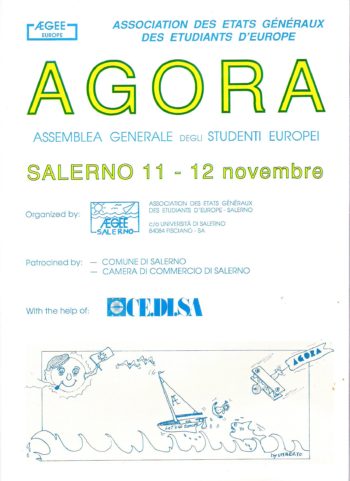
Golden Times: Is it true that the organisers drove the partcipants around in their cars?
Alfonso: Yes is true.Since we couldn’t rent coaches, we decided to ask a further effort from our members that offered their time, cars and gas. Indeed, thanks to this collaboration spirit and the capability to “manage everything with what we’ve got”, we were able, with few resources but full of willing and enthusiasm, to organize in Salerno this important event.
Golden Times: There was no Internet back then. You communicated with the participants by fax, letter and phone. Was it very messy?
Alfonso: Believe me, I struggle to remember that we managed all that stuff without the technology we use nowadays. Really, it seems to talk about prehistoric archeology. As we proceeded through the preparations, hundreds of phone calls and faxes occurred. Just in order to get a vague idea who, from where, how and at what time was arriving in Salerno. Actually, we scheduled their arrival at the railway station and since we couldn’t be informed in real time of delays or changes, we organised a continuous pick-up service for the delegates that were arriving. Luckily, since at that time travelling wasn’t that common as today and given that it wasn’t a high season period, it was easy to recognize an AEGEE member.
Golden Times: How high was your antenna’s phone bill?
Alfonso: You should ask our parents. I can remember the resignation of my father who had understood that he had completely lost the ownership of his own telephone…
Golden Times: How were the Agora parties? And was there a big townhall reception?
Alfonso: Of course we had a European Night in a disco-pub. There was a band made up also by AEGEE-Salerno members. I still remember the chorus for U2’s “Pride (In the Name of Love)”. Well, maybe some of us weren’t so much in tune. Perhaps someone was pretty drunk. For the reception we were able to use the “Salone dei Marmi” of the Municipality of Salerno, while for the Agora’s activities we chose the “Soccorso Amico’s International Congress Hall”. Considering the times, it was a functional place.
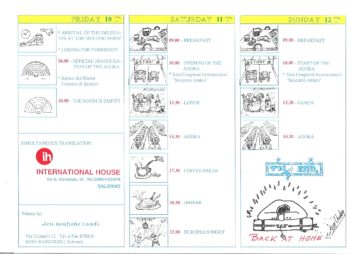
Golden Times: Your Agora received the patronage of the President of the Italian Republic, right?
Alfonso: Our idea to ask for the High Patronage of the President of the Italian Republic came together with the enthusiasm for Europe and with the presumption that the association’s ideal would break any obstacles. Fabrizio Moscati, as President of AEGEE-Salerno, signed the letter of request. Actually, hoping for an answer from the President of the Republic for an initiative organized by some twenty-year old students was vain. But on the contrary, some days before the event started, we received a response letter from the President in which he wished us success for the event. He wrote that he completely shared AEGEE-Europe’s ideals. It was a big satisfaction that convinced us that AEGEE was, and still is, an extraordinary idea.
Golden Times: Coming back to the Agora agenda: the Agora made another important decision: decreasing the number of CD members from 30 to 16. Was the new system better? And was there a big resistance towards this change?
Alfonso: Of course, as comprehensible, there was resistance. People “in the system” normally resist. A big Comité Directeur made up of around 30 persons – most of them not really operative – was perhaps understandable for the first years of AEGEE when the antennae and members were in limited number and AEGEE was mainly the CD. But the organizational system based on the “Comité Directeur and the rest” was for sure not anymore adherent to the evolving times. I cannot, and don’t want, to judge if the new system proved to be better, but it is indisputable that since those changes – of course thanks also to other circumstances – the network growth has been exponential, many activities had been re-launched and, above all, other organisational bodies – like Commissions and Committees – were born, implying a more balanced distribution of power and competencies.
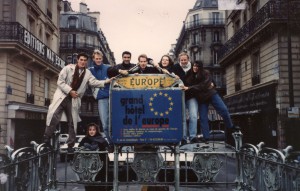
Golden Times: Also changing the election system was discussed, but only done one Agora later. Why did the old list election system fail, where the CD candidated as a block, not as individual people?
Alfonso: Well, the changing of the election system was part of the previous framework I described. If you want or need more participation from members and peripheries of Europe, you need a more democratic and less centralized system of election. The shifting from the “list election” method – which basically meant the choose of the new CD member by the old ones- to the “personal candidature” was discussed firstly in order to give everyone the chance to propose himself, and secondly in order to make the Comité Directeur members more responsible through the presentation of a personal report. These decisions were postposed to 1990, passing through an inconclusive spring Agora in Paris, till the autumn one in Bonn, still capital of a reunited Germany.
Golden Times: What happened at Agora Bonn?
Alfonso: At the autumn Agora 1990 for the first time, but also for the last time, two lists were presented and competing for the election. Another exciting moment. One of the two lists, named symbolically “AEGEE, Quo Vadis?”, of which I was part of, won with a huge majority and finally brought to conclusion in 1991 at the spring Agora of Amsterdam another of the guidelines discussed during our Agora in Salerno: the shifting from the “list election” to the “personal candidature”. In fact, at the autumn Agora in Budapest 1991, the first in Central and Eastern Europe, we were re-elected not as list but at personal title.
Golden Times: So you became CD member one year after Agora Salerno. Was this also the result of your Agora and its special spirit?
Alfonso: Definitively yes! In 1990, a group of persons, partly coming from the East-West Working Group, was implementing an initiative, the above mentioned “AEGEE, Quo Vadis?”, aiming to present a programme and an election list at the autumn Agora in Bonn. The Quo Vadis project was committed to create a more progressive and liberal AEGEE and strongly supported its opening toward Central and Eastern Europe – this mainly thanks to Michael Merker. The chosen motto was “Students are Building Bridges Across Europe”. After the falling of the Wall, it was time to re-connect Europe.
Golden Times: How did you get involved with “AEGEE, Quo Vadis”?
Alfonso: Eric Magielse, the future Secretary General, was one of the people involved in the making of Quo Vadis. He called me on the phone and proposed me to join the group. Clearly, I was honored, but at the same time a little bit bewildered. At the end, I would have been in charge of the networks’ development. For the first time a “Network Development Responsible” position was created, as the Network Commission didn’t exist yet. When I think about it, sincerely, I have to bless that moment. An unbelievable world was about to open up in front of me.
Golden Times: The Agora had a huge impact on AEGEE. How does it make you feel?
Alfonso: I have to admit it: I couldn’t imagine that we were organising something that would become memorable in AEGEE-Europe’s history. And we didn’t expect we had the chance to live those days we’ve been working for months, talking about an event, which happened exactly twenty-four hours before our Agora – the Fall of the Berlin Wall – that would change the world’s future and, ahead of its time, our association as well. That has been one of those moments you say later to yourself: yes, I was in the right place at the right time! I feel lucky and grateful for that.
Golden Times: What was the impact of the Agora on your antenna?
Alfonso: For our antenna it had two consequences: at that time a series of organisational changes and later on being considered a pillar in AEGEE-Salerno’s 25 years long history. In the two years following the Agora we changed our statutes and electoral system – we also had a first and last “battle of lists” on local level; we reduced the number of our local board members, we renewed our means and communications tools with our members, we had working groups and people active at European level and we had a growth in members and activities. For the history of our antenna, that Agora is of course a precious pearl. Not only because of the imperturbable passing by of time, but especially because of the fabulous coincidence that happened between that decisive moment of the past century – the falling of the Berlin wall – and the association’s destiny at European level, which was determined just in that occasion in Salerno. As I wrote in the introduction of the 20th Anniversary Book of AEGEE-Salerno: “It was a moment in which, maybe more than in many other ones, the associative activities superimposed on the international events like twin frames of the same film. And Salerno, from a certain point of view, was its setting”. Actually, thinking about those days, the event was like an epic feat. At least this was the perception at the 20th anniversary of the Antenna five years ago. Let me say that I’m proud of what us and the following generations achieved and learned during the 25 years long history of AEGEE-Salerno. But time passes and new generations have, naturally, their time and they, rightly, look forward. Maybe – I strongly hope – they will organize another Agora in Salerno in 2019, in the occasion of the 30th anniversary of both AEGEE-Salerno’s foundation and that historic Agora of 1989. Of course, I wish them another wonderful,unforgettable success!
Related Posts
1st August 2019
The Gallery of All Presidents of AEGEE-Europe
Here is the gallery of all Presidents of AEGEE-Europe - with photos of every one of them. Enjoy the list!

